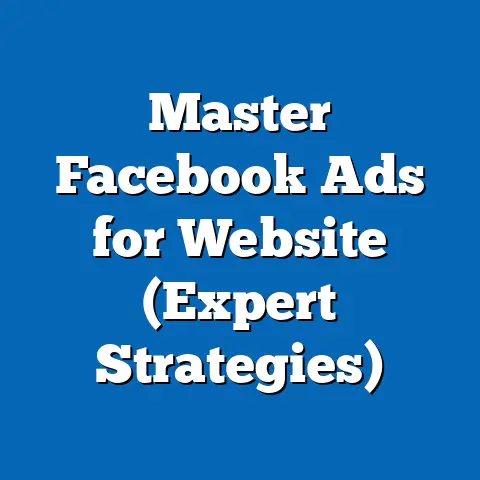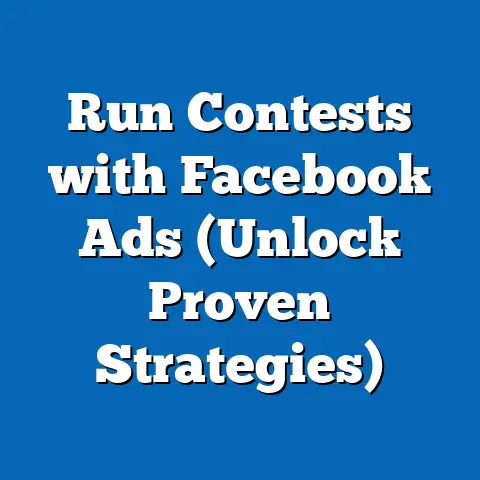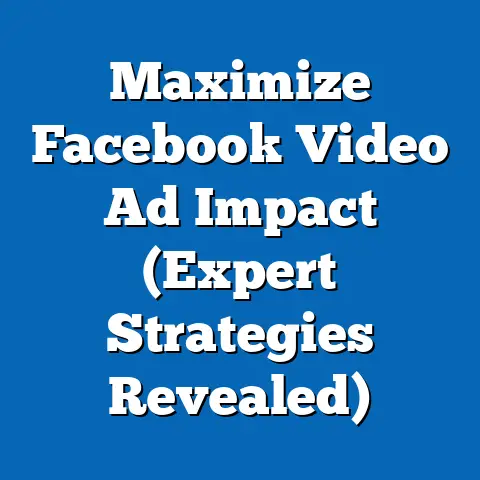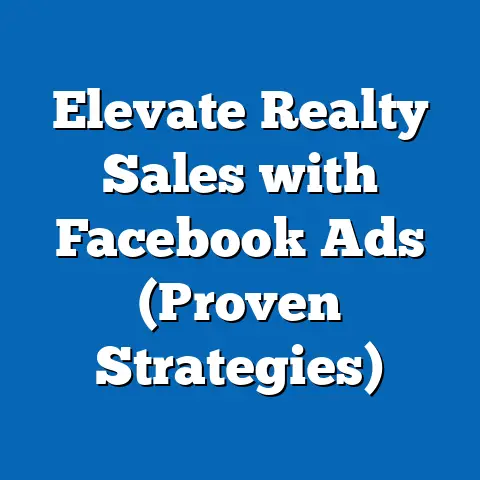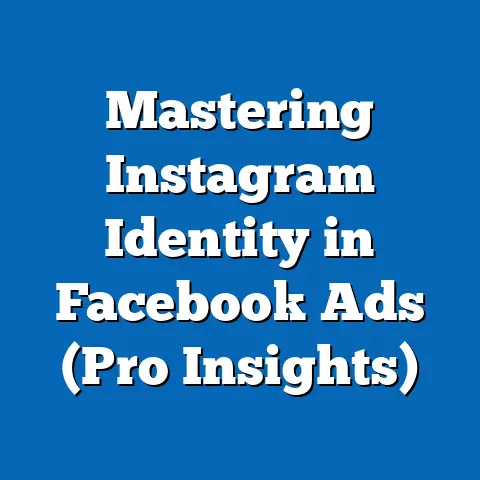Do Adblock Extensions Block Facebook Business Ads? (Critical Insights)
Did you know that over 30% of internet users have installed ad blocker extensions on their browsers, significantly impacting how businesses reach their audiences online?
It’s a staggering number, and it speaks to a growing trend of users taking control of their online experience.
As a digital marketing specialist with years of experience navigating the ever-changing landscape of online advertising, I’ve seen firsthand how these adblockers can impact campaign performance.
This article dives deep into the world of adblock extensions and their impact on Facebook business ads.
We’ll explore whether these tools effectively block Facebook ads, the implications for marketers, and what the future might hold for advertising on the platform.
Understanding Adblock Extensions
Adblock extensions are software tools designed to prevent advertisements from appearing on web pages.
They work by identifying and filtering out content that matches known advertising patterns, such as specific URLs, image sizes, or code snippets.
These extensions are typically installed as browser add-ons, seamlessly integrating into the user’s browsing experience.
There’s a wide range of adblockers available, from simple, browser-based extensions like AdBlock and Adblock Plus to more advanced options like uBlock Origin, which boasts a lighter footprint and more customizable filter lists.
Some browsers, like Brave, even come with built-in adblocking capabilities.
Mobile versions are also prevalent, offering system-wide adblocking on smartphones and tablets.
The primary goal of adblockers is to enhance the user experience.
By eliminating intrusive ads, they aim to increase page loading speed, reduce data consumption, and protect user privacy by blocking tracking scripts.
For many users, the internet without ads is a faster, cleaner, and safer place to be.
Takeaway: Adblock extensions are designed to improve the user experience by removing ads, speeding up page loading, and protecting privacy.
The Mechanics of Facebook Ads
Before we can understand how adblockers interact with Facebook ads, it’s crucial to understand how Facebook ads work.
Facebook ads are served to users based on a complex algorithm that considers a multitude of factors, including demographics, interests, behaviors, and connections.
This targeting mechanism allows advertisers to reach specific audiences with tailored messages.
Facebook offers a variety of ad formats, including image ads, video ads, carousel ads, and lead generation ads.
These ads are strategically placed within the user’s news feed, sidebar, and other areas of the platform to maximize visibility.
The ad delivery system is deeply integrated with user activity, constantly learning from interactions like clicks, likes, shares, and comments to optimize ad placement and targeting.
It’s important to distinguish between organic content and paid advertisement visibility on Facebook.
Organic content refers to posts from friends, family, and followed pages that appear in the news feed based on Facebook’s algorithm.
Paid ads, on the other hand, are specifically designed to reach a wider audience beyond a page’s existing followers, using targeted advertising to reach the right people.
I’ve found that understanding this distinction is crucial when assessing the impact of adblockers, as they primarily target the paid advertisements that businesses rely on.
Takeaway: Facebook ads are served based on a complex algorithm that considers various targeting mechanisms and ad formats, differing significantly from organic content.
Do Adblock Extensions Block Facebook Ads?
This is the million-dollar question!
The effectiveness of adblock extensions in blocking Facebook ads is a complex issue, and the answer isn’t a simple yes or no.
While adblockers are designed to filter out advertising content, Facebook has implemented strategies to circumvent these tools, making it challenging for them to block all ads consistently.
Popular adblock extensions like Adblock Plus and uBlock Origin rely on filter lists and heuristics to identify and block ads.
These lists contain rules and patterns that match known advertising elements, such as specific URLs, image sizes, or code snippets.
When an adblocker detects content that matches these criteria, it prevents it from loading on the page.
However, Facebook actively works to disguise its ads as organic content, making it more difficult for adblockers to distinguish between the two.
This often involves using dynamic ad formats, changing ad URLs, and employing other techniques to evade detection.
Studies have shown that adblockers can block a significant percentage of Facebook ads, but the exact number varies depending on the specific adblocker, the filter lists used, and Facebook’s countermeasures.
Some reports suggest that adblockers can block anywhere from 20% to 50% of Facebook ads, while others indicate that the effectiveness is lower.
Certain ad formats, such as native ads or video ads, may be less likely to be blocked due to their seamless integration into the user’s news feed.
Native ads are designed to blend in with the surrounding content, making them harder to identify as advertisements.
Similarly, video ads often use dynamic streaming techniques that make them difficult to block without disrupting the entire video player.
In my experience, I’ve seen campaigns where adblock users were virtually non-existent, and others where they represented a noticeable segment of the target audience.
It really depends on the audience demographics and their tech savviness.
Takeaway: Adblockers can block a significant percentage of Facebook ads, but Facebook’s countermeasures and the use of native ad formats can reduce their effectiveness.
The Impact of Adblockers on Facebook Advertising
The rise of adblock usage has had a significant impact on Facebook advertising, affecting everything from revenue to brand visibility.
For advertisers, the potential loss of reach and engagement due to adblockers can be substantial.
If a significant portion of the target audience is using adblockers, the effectiveness of ad campaigns can be severely diminished, leading to lower conversion rates and a reduced return on investment.
This revenue loss is a serious concern.
Facebook, like many other online platforms, relies heavily on advertising revenue to support its operations and provide free services to users.
When adblockers prevent ads from being displayed, it directly impacts Facebook’s bottom line, potentially leading to higher ad prices for advertisers to compensate for the lost inventory.
In response to adblock usage, businesses are adapting their strategies in various ways.
Some are focusing on creating more engaging and less intrusive ad formats that are less likely to be blocked.
Others are investing in influencer marketing and organic content to reach audiences through alternative channels.
I’ve personally seen a shift towards prioritizing quality content and building genuine relationships with customers, rather than relying solely on paid advertising.
The implications for brand visibility and customer engagement are also noteworthy.
When ads are blocked, businesses lose the opportunity to reach potential customers and build brand awareness.
This can be particularly challenging for smaller businesses and startups that rely on Facebook advertising to reach their target market.
Takeaway: Adblock usage can lead to revenue loss for advertisers, reduced brand visibility, and a need for businesses to adapt their strategies.
User Perspectives on Adblockers and Facebook Ads
To truly understand the impact of adblockers, it’s essential to consider the user’s perspective.
Users install adblockers for a variety of reasons, including the desire to eliminate intrusive ads, increase page loading speed, and protect their privacy.
For many, the internet has become synonymous with annoying pop-ups, autoplay videos, and excessive tracking, leading them to seek out adblockers as a solution.
However, there’s also a recognition that free content is often funded by ads.
Many users understand that websites and platforms like Facebook rely on advertising revenue to provide free services.
This creates a tension between the desire for a clean, ad-free experience and the need to support the content creators and platforms they enjoy.
Surveys and studies have revealed a range of user attitudes towards ads on social media platforms.
Some users are highly averse to all forms of advertising, while others are more tolerant of ads that are relevant and non-intrusive.
I’ve found that the key is to understand the user’s mindset and tailor advertising strategies accordingly.
For example, a study by HubSpot found that 77% of people prefer filterable advertising.
This suggests that users are more receptive to ads that they have some control over, such as the ability to choose the types of ads they see or opt out of certain advertising campaigns.
Takeaway: User perspectives on adblockers and Facebook ads vary, with many users seeking a balance between a clean, ad-free experience and the need to support free content.
The Future of Advertising in a World with Adblockers
Looking ahead, the future of Facebook advertising in a world with adblockers is uncertain.
As adblock usage continues to grow, Facebook and other platforms will need to adapt their strategies to remain effective.
One potential solution is to focus on transparent advertising practices.
By being upfront about how ads are targeted and delivered, and by giving users more control over their advertising experience, platforms can build trust and reduce the likelihood of users installing adblockers.
Another approach is to improve ad relevance.
When ads are highly relevant to the user’s interests and needs, they are less likely to be perceived as intrusive or annoying.
Facebook’s sophisticated targeting capabilities offer the potential to deliver highly personalized ads, but it’s crucial to use this power responsibly.
Innovations in advertising technology may also play a role in counteracting adblockers.
For example, some companies are developing techniques to embed ads directly into the content stream, making them more difficult to block.
However, these techniques must be used carefully to avoid alienating users and triggering a backlash.
Legislation and regulation may also shape the advertising landscape.
As governments around the world grapple with issues of online privacy and data protection, new laws may be enacted that impact the way ads are targeted and delivered.
It’s essential for businesses to stay informed about these developments and adapt their strategies accordingly.
Takeaway: The future of Facebook advertising in a world with adblockers will depend on transparent advertising practices, improved ad relevance, and innovations in advertising technology.
Conclusion
In conclusion, adblock extensions do have an impact on Facebook business ads, though the extent of that impact is constantly evolving.
While adblockers can effectively block a significant percentage of ads, Facebook’s countermeasures and the use of native ad formats can reduce their effectiveness.
This creates an ongoing challenge for marketers to adapt to changing user preferences and the technological landscape.
The key takeaway is that marketers need to be proactive in understanding and addressing the issue of adblock usage.
By focusing on creating engaging, relevant, and non-intrusive ads, and by exploring alternative advertising channels, businesses can mitigate the impact of adblockers and continue to reach their target audience effectively.
The future of digital advertising will likely involve a greater emphasis on user experience and a more collaborative approach between platforms, advertisers, and users.
By prioritizing transparency, relevance, and control, we can create a more sustainable and mutually beneficial advertising ecosystem.
Call to Action
What are your experiences with Facebook ads and adblockers?
Do you use an adblocker?
If so, why?
Share your thoughts and experiences in the comments below!
Let’s start a conversation about the future of advertising and how we can create a better online experience for everyone.

